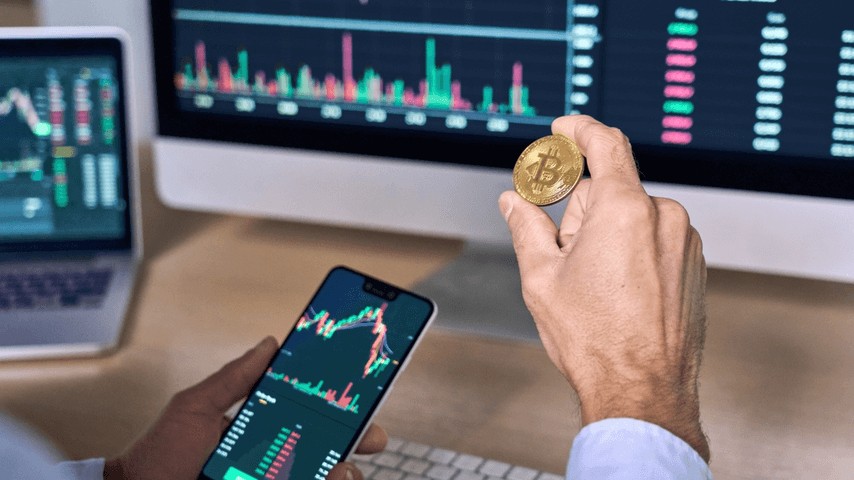When venturing into the world of cryptocurrency trading, one cannot underestimate the significance of risk management. It serves as a pillar for success and ensures that your hard-earned money is not lost in the tumultuous market. Cryptocurrencies are known for their volatility, and without effective risk management strategies, losing funds is inevitable. Here are five effective ways to manage risks in bitcoin and altcoin trading:
Educate Yourself
Knowledge is power in the world of crypto trading. Take the time to learn about blockchain technology, different cryptocurrencies, and the factors that affect their value. Stay updated with industry news and trends. By being well-informed, you reduce the risks of trading blindly.
Diversify Your Portfolio
It’s often said, “Don’t put all your eggs in one basket.” This principle holds true for crypto trading as well. Diversify your portfolio by investing in multiple cryptocurrencies rather than just one or two. By spreading your investments across different assets, you reduce the risk of being heavily impacted by the performance of a single cryptocurrency. If one investment underperforms, the others may compensate for it.
Set Clear Risk Management Strategies
Before entering any trade, you have to define your risk tolerance and establish clear risk management strategies. Determine the maximum percentage of your portfolio that you’re willing to risk on a single trade. Also, set stop-loss orders to automatically sell a cryptocurrency if it reaches a specific price level. This way, you can limit your losses.
Use Proper Position Sizing
Position sizing refers to determining the appropriate amount of capital to allocate to each trade. It’s important not to risk too much on a single trade, as it could lead to substantial losses. A commonly recommended approach is to risk no more than 1-2% of your total trading capital on any given trade. This way, even if a trade goes against you, the impact on your overall portfolio is limited.
Stay Emotionally Balanced
Emotions can cloud judgment and lead to impulsive decisions, particularly in the volatile world of crypto trading. Greed and fear are common emotions that can result in poor trading choices. You have to make rational decisions based on analysis, rather than succumbing to FOMO (fear of missing out) or panic selling during market downturns. Stick to your trading plan and avoid making impulsive trades driven by emotions.
Remember, managing risks in bitcoin and altcoin trading is an ongoing process. Regularly reassess your strategies, adapt to market conditions, and be open to learning from both successes and failures.

How to Trade Bitcoin and Altcoin
If you’re new to this space or looking to expand your investment portfolio, this guide is designed to provide you with a simple introduction to trading Bitcoin and altcoins. From understanding the basics to choosing the right platforms and making smart trading decisions, we’ll walk you through the essentials so that you can confidently embark on your trading journey.
- Research: Before diving into trading, educate yourself about cryptocurrencies, blockchain technology, and the fundamentals that affect their prices. Understanding the market dynamics will help you make informed trading decisions.
- Choose a Reliable Exchange: Select a reputable cryptocurrency exchange that supports the trading of Bitcoin and altcoins. Look for exchanges with a user-friendly interface, security measures, and a wide range of available cryptocurrencies. Some popular exchanges include Quidax, Dart Africa, Luno, and Binance.
For traders looking to convert their cryptocurrencies to cash, Dart Africa is a reliable platform that enables users to sell their crypto assets and receive cash in return. Whether you’re a seasoned trader or new to the crypto space, we offer a secure way to liquidate your holdings. - Create an Account: Sign up on your chosen exchange and complete the registration process. This typically involves providing your personal information, verifying your identity, and setting up two-factor authentication (2FA) for added security.
- Secure Your Digital Wallet: Set up a digital wallet to store your cryptocurrencies securely. Wallet options include software wallets (e.g., Trust Wallet, Atomic Wallet), hardware wallets (e.g., Ledger, Trezor), or online wallets provided by the exchange. Make sure you understand the wallet’s features, backup procedures, and security protocols.
- Deposit Funds: Fund your exchange account by depositing funds. Most exchanges support various deposit methods, such as bank transfers, credit/debit cards, or cryptocurrency transfers. Choose the method that suits you best and follow the instructions provided by the exchange.
- Analyze the Market: Perform technical and fundamental analysis to identify trading opportunities. Technical analysis involves studying price charts, indicators, and patterns to predict future price movements. Fundamental analysis involves assessing factors like news, project developments, and market sentiment that can impact a cryptocurrency’s value.
- Develop a Trading Strategy: Create a clear trading strategy that suits your risk tolerance and investment goals. Define your entry and exit points, determine your position sizing, and set stop-loss and take-profit levels to manage risk effectively.
- Place Your Trades: Once you’ve identified a trading opportunity, place your trades on the exchange. Choose the trading pair (e.g., BTC/USD, ETH/BTC) and select the type of order you want to execute (market order, limit order, stop order). Double-check the details before confirming the trade.
- Monitor Your Trades: Keep a close eye on your trades after they are executed. Monitor price movements, news events, and market conditions that may affect your positions. Consider setting up alerts or using trading tools provided by the exchange to stay informed.
- Regularly Review: Regularly evaluate your trading performance and adjust your strategy as needed. Keep a trading journal to track your trades. Adapt to market changes to improve your trading skills over time.
Trading cryptocurrencies involves risks, and it’s important to start with only the amount you can afford to lose. Never invest more than you can comfortably handle. As you gain experience, you can refine your trading techniques and explore more advanced strategies.





